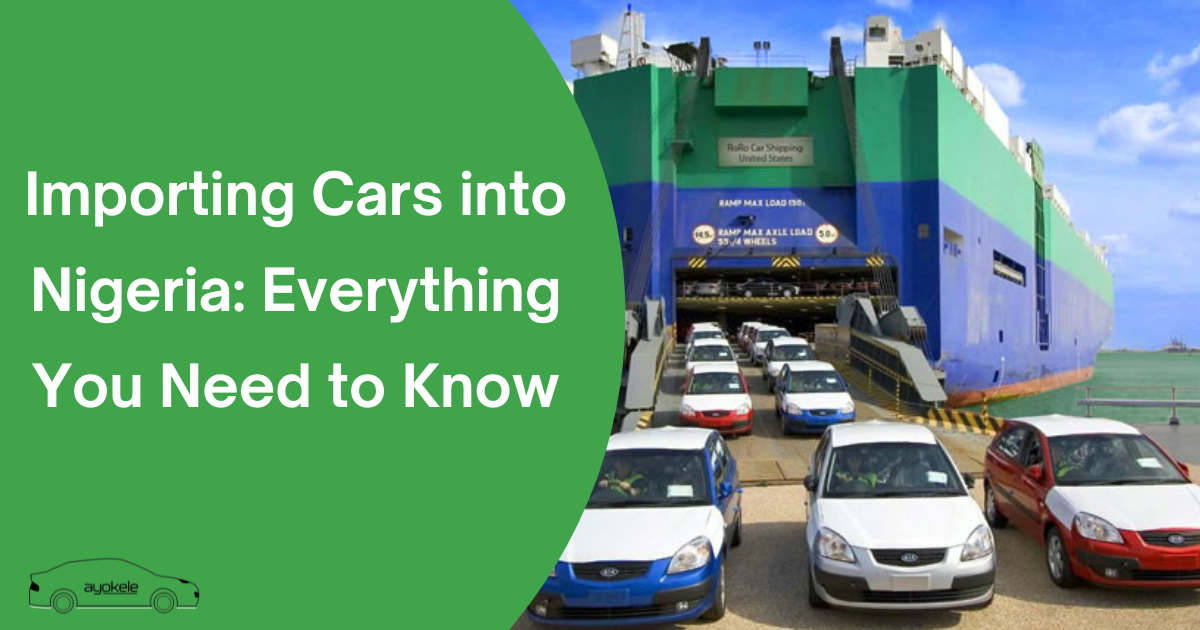Importing cars into Nigeria is big business. Every month, thousands of cars arrive at the ports from different countries around the world. As more Nigerians need cars for personal and business use, importing vehicles has become both important and profitable.
The rules for importing cars into the country have changed recently. The government has made new laws about:
- How old imported cars can be
- How much tax you need to pay
- What documents you need
- Which ports you can use
If you’re thinking about importing a car, whether for yourself or as a business, you need to understand these rules. Making a mistake will cost you time and money. That’s why we’ve created this guide to help you.
In this guide, we’ll explain:
- All the steps you need to follow
- How much everything will cost
- How to choose the right car to import
- How to work with shipping companies
- Common problems and how to solve them
- Tips to save money and avoid scams
We’ve written this guide for everyone – from someone importing their first car to business owners who want to import many cars.
Legal Requirements and Regulations
Before you start importing a car into Nigeria, you need to understand the rules and regulations that govern the process. The Nigerian government has put these rules in place to control the quality of vehicles entering the country, protect consumers, and ensure proper tax collection. Let’s break down each major requirement in simple terms.
Age Limit for Cars
The government is concerned about old cars being dumped in the country. To prevent this and ensure road safety, they’ve set strict rules about how old imported cars can be. This helps keep unsafe or heavily worn vehicles off Nigerian roads and encourages the import of newer, safer cars.
Currently, any car you want to import must be less than 12 years old from its manufacturing date. This means if you’re importing in 2024, your car should not have been made before 2012. Officials will check the car’s age using its Vehicle Identification Number (VIN) and original documents. For example, if you try to import a 2010 Toyota Camry in 2024, it won’t be allowed because it’s older than 12 years.
Documentation Requirements
Importing a car involves a lot of paperwork. These documents prove that you legally own the car, have paid all necessary taxes, and are following all import rules. Think of these papers as your car’s passport – they tell its whole story and prove you have the right to bring it into Nigeria.
You must have a Bill of Lading, which shows you own the car and details its journey to Nigeria. You’ll also need the Purchase Receipt to prove you bought the car legally. The original car registration papers from the country where you bought the car are essential. Your bank will help you get Form M, which is Nigeria’s way of tracking imports. You’ll also need a SONCAP Certificate to show the car meets Nigeria’s standards, plus your personal ID and Tax Identification Number.
Import License Explained
An import license is like a permission slip from the government to bring goods into Nigeria. This license shows that you’re a legitimate importer and helps the government track what’s coming into the country. Getting one involves proving that you’re a responsible importer who will follow all the rules.
To get your import license, you need to register with the Nigeria Customs Service and the Ministry of Trade and Investment. The license is valid for one year, and if you’re a car dealer, you can use it to import multiple cars. You’ll need to provide your business registration documents, tax clearance certificate, and bank references. The process usually takes about two to three weeks.
Customs Regulations and Process
Nigerian Customs Service plays a crucial role in the import process. They’re responsible for making sure all imported cars meet the country’s requirements and that proper taxes are paid. Think of them as the gatekeepers who check everything before allowing your car into Nigeria.
When your car arrives at the port, customs officers will physically inspect it and check all your documents. They’ll verify the car’s value to calculate import duties, which must be paid before you can take your car. You must use official seaports like Tin Can Island or Apapa port – bringing cars through land borders is not allowed. The customs process usually takes 7-14 days if all your documents are in order.
Vehicle Standards and Safety
There are specific standards for imported vehicles to ensure they’re safe for use on Nigerian roads. These standards protect buyers and make sure imported cars won’t cause problems once they’re being used in the country.
Your car must be left-hand drive – this means the steering wheel should be on the left side of the car. The vehicle needs to have working airbags, functional seat belts, and proper braking systems. All lights, including headlights, brake lights, and indicators, must work properly. The car’s engine should be in good condition, and the chassis must not be damaged. Salvage or badly accidental vehicles are not allowed.
Environmental Requirements
The country is becoming more environmentally conscious, and this affects car imports. Cars must meet basic emission standards to help control air pollution in Nigerian cities. Your imported car should have a working catalytic converter and a proper exhaust system. While Nigeria hasn’t yet set specific emission limits like many Western countries, they do check that cars aren’t visibly polluting. Electric and hybrid cars get special treatment, including lower import duties, to encourage more environmentally friendly vehicles.
Registration Process
After successfully importing your car, you need to register it before you can legally drive it on Nigerian roads. This process turns your imported car into a properly documented Nigerian vehicle.
First, get your customs clearance documents in order. Then obtain a police report verifying the car isn’t stolen. Take these to your state’s vehicle licensing office to get registered. They’ll give you a number plate and vehicle papers. This process typically takes about a week.
Costs Associated with Importing Cars into Nigeria
Importing a car involves several costs beyond the purchase price of the vehicle. These expenses cover everything from shipping to registration, and it’s important to understand them to plan your budget effectively.
1. Purchase Price of the Car
This is the initial cost of the car from the seller or dealership. The price varies depending on factors like the car’s make, model, year, and condition (new or used). It’s important to negotiate the price and confirm the car’s value before proceeding with the purchase.
2. Shipping Fees
Shipping costs depend on the distance between the country of purchase and Nigeria. These fees include the transportation of the car via sea freight and handling charges at the port. Popular shipping ports for cars in Nigeria include Apapa and Tin Can Island in Lagos.
3. Customs Duties and Levies
The Nigeria Customs Service (NCS) charges import duties based on the car’s value and specifications. Customs duties generally range from 20% to 35% of the car’s assessed value. Other levies include VAT (Value Added Tax) and sometimes a surcharge for older vehicles. These charges must be paid before the car is cleared from the port.
4. Clearing Agent Fees
Hiring a clearing agent is crucial for navigating customs and ensuring the car is properly cleared. Clearing agents charge a fee for their services, which covers documentation, inspections, and the handling of legal processes at the port.
5. Port Charges
Port charges include fees for storage, terminal handling, and other administrative services. If the car stays at the port longer than expected, additional storage fees, known as demurrage, will apply. It’s essential to clear the car promptly to avoid these extra costs.
6. Registration and Licensing Fees
Once the car is cleared, you’ll need to register it with the Federal Road Safety Corps (FRSC) and pay for a vehicle license, proof of ownership, and a roadworthiness certificate. These costs vary depending on the state and type of vehicle but are mandatory for legal road use.
7. Insurance Costs
At least third-party insurance is legally required in Nigeria. While this is relatively affordable, comprehensive insurance may be a better option for protecting your investment, especially for high-value vehicles.
How to Import Cars in Nigeria: Step-by-Step Guide to Importing Cars
Step 1: Research and Choose the Car
The first step is deciding what type of car you want to import. Think about your budget and your needs—whether you’re looking for a small car, an SUV, or a luxury vehicle. Make sure the car is in good condition and fits Nigerian customs rules, such as not being older than 12 years from the date of manufacture.
You should also research trusted platforms or sellers like Cars.com, Autotrader, or certified dealers. To avoid buying a stolen or faulty car, check the car’s history using tools like Carfax or AutoCheck. It’s better to spend time researching than to face issues later.
Step 2: Hire a Reliable Shipping Company or Clearing Agent
Shipping the car to Nigeria requires a trusted shipping company or clearing agent. A clearing agent is especially important because they handle customs clearance and make sure your car goes through the proper legal process. They will also guide you on what documents are needed.
The main documents required include the bill of lading, purchase receipt, proforma invoice, and proof of customs duty payment. A clearing agent can help with all these, ensuring a smooth process at the port. Always choose a reputable agent to avoid delays or unnecessary expenses.
Step 3: Understand the Costs Involved
Importing a car involves several costs, such as the car’s purchase price, shipping fees, customs duties, VAT, and port charges. Customs duties are regulated by the Nigeria Customs Service (NCS) and depend on the car’s value and specifications. You may also need to pay fees for port storage if the car isn’t cleared on time.
Your clearing agent can provide a detailed estimate of all costs, including their fees. Planning your budget ahead of time ensures you’re prepared for both expected and unexpected expenses.
Step 4: Clear the Car Through Customs
Once the car arrives in Nigeria, it must be cleared through customs at an approved port, like Apapa or Tin Can Island in Lagos. Customs officials will inspect the car and confirm that all duties and levies have been paid.
To clear the car, you need documents such as:
- Bill of lading: Provided by the shipping company as proof of shipment.
- Customs duty payment receipt: Proof that you’ve paid the required import duties.
- Proforma invoice: A detailed invoice of the car purchase.
- Vehicle identification number (VIN): To verify the car’s history and age.
After the inspection, customs will issue a clearance certificate, which you need to move the car from the port.
Step 5: Obtain Necessary Documentation
After customs clearance, you must complete additional paperwork to make the car legal for Nigerian roads. This includes:
- Roadworthiness Certificate: Obtained from the Vehicle Inspection Office (VIO) to confirm the car is safe to drive.
- Vehicle License: Issued by the Federal Road Safety Corps (FRSC), allowing the car to operate legally.
- Proof of Ownership: A document that shows you are the rightful owner of the car.
- Insurance: At least third-party insurance is mandatory under Nigerian law
Common Challenges in Car Importation in Nigeria
1. Delays in Shipping and Customs Clearance
One of the most common challenges is delays in the shipping process and customs clearance. Shipping timelines can be affected by port congestion, weather conditions, or logistical issues. Additionally, customs procedures may take longer than expected if there are discrepancies in documentation or a high volume of cars awaiting clearance. These delays can lead to increased costs, such as demurrage fees for extended storage at the port.
2. Unexpected or Hidden Costs
Importing a car often comes with unexpected expenses, such as additional port charges, demurrage fees, or higher customs duties than anticipated. These hidden costs can strain your budget, especially if you’re not well-prepared. Many first-time importers underestimate the total cost of importation, which includes shipping, duties, clearing agent fees, and registration.
3. Risk of Fraud or Scams
Fraud is a significant concern when importing cars. Unscrupulous dealers, shipping companies, or clearing agents may provide false information, inflate costs, or fail to deliver the car as promised. Some buyers have been victims of scams involving fake documents or vehicles that do not match the descriptions provided.
4. Issues with Car Condition
Despite careful research, there is always a risk that the car arrives in a condition different from what was promised by the seller. This could include hidden damages, missing parts, or mechanical problems that require immediate repairs. Without a proper inspection or history check, you may end up with a car that costs more to fix than expected.
5. Challenges with Documentation
Incomplete or inaccurate documentation can lead to significant delays in the importation process. Missing papers like the bill of lading, customs duty receipt, or proforma invoice can prevent your car from being cleared at the port. Navigating Nigeria’s documentation requirements can be complex, especially for first-time importers.
6. Compliance with Customs Regulations
Nigeria’s customs regulations are strict, with specific rules about the age and condition of imported cars. Cars older than 12 years or those that don’t meet emission standards may be seized or denied clearance. Ensuring compliance with these regulations requires thorough research and preparation.
Tips for a Smooth Importation Process
1. Research Thoroughly Before Purchasing
Take the time to research the car you want to import, including its make, model, year, and market value. Ensure that the car complies with Nigerian customs regulations, such as the 12-year age limit. Verify the car’s history using trusted platforms like Carfax or AutoCheck to avoid buying a stolen or damaged vehicle. Choosing a reputable seller or certified dealership can also help minimize risks.
2. Use Trusted Shipping Companies and Clearing Agents
A reliable shipping company or clearing agent is key to a smooth importation process. Look for companies with a good track record and positive reviews. Reputable agents can help handle customs documentation, inspections, and other formalities, reducing the likelihood of delays. Make sure to sign a clear agreement with the agent outlining their responsibilities and fees.
3. Ensure All Documentation Is Complete and Accurate
Missing or incorrect documents can cause significant delays during customs clearance. Before shipping, double-check that you have the required documents, such as the bill of lading, proforma invoice, and customs duty receipt. Work closely with your clearing agent to ensure all paperwork is in order and meets the requirements of the Nigeria Customs Service (NCS).
4. Plan for Additional Costs
Budgeting is crucial when importing a car. Beyond the car’s purchase price, account for shipping fees, customs duties, clearing agent fees, and port charges. Set aside extra funds to cover unexpected expenses, such as demurrage fees if the car remains at the port longer than expected. Being financially prepared will help you avoid stress and delays.
5. Monitor the Shipping and Clearance Process
Stay updated on the status of your car throughout the shipping and customs clearance process. Regular communication with your shipping company and clearing agent can help you address potential issues promptly. This proactive approach ensures that you’re informed at every stage and can take action if needed.
6. Inspect the Car Upon Arrival
Once your car arrives, inspect it thoroughly to ensure it matches the seller’s description. Check for any damages or missing parts and confirm that all features are working properly. If there are any discrepancies, report them immediately to the seller or shipping company for resolution.
7. Complete Registration and Licensing Promptly
After customs clearance, ensure your car is registered with the Federal Road Safety Corps (FRSC) and obtain all necessary documents, including the roadworthiness certificate, vehicle license, and proof of ownership. This step is essential for legal operation on the roads and avoids penalties for non-compliance.




